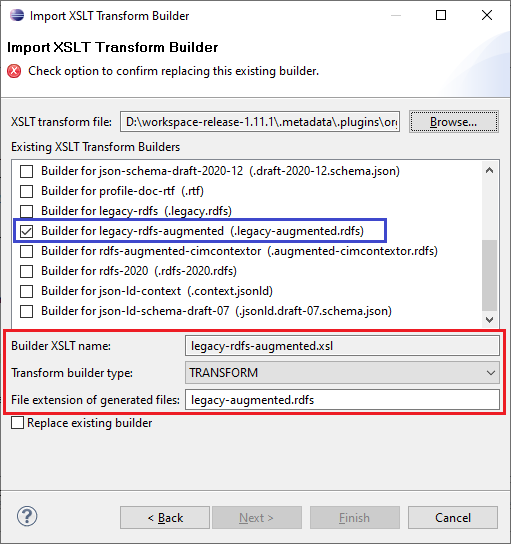CIMTool-Builders-Library
legacy-rdfs-augmented.xsl
This builder currently ships with CIMTool.
Builder Description
The legacy-rdfs-augmented.xsl builder generates RDFS schema in primary alignment with that defined within the IEC 61970-501:2006 “Common Information Model Resource Description Framework (CIM RDF) schema” published standard. The IEC 61970-501:2006 standard describes the format and rules for producing a machine readable form of the Common Information Model (CIM) as specified in the IEC 61970-301 standard. It describes a CIM vocabulary to support CIM semantics. The builder has been retained for legacy and historical purposes.
Note, though not currently published as a formal standard, there has been “de facto agreements” on additional extensions to that defined in the IEC 61970-501:2006 in order to better support CIM RDFS semantic needs. Introduced after the publication of the IEC 61970-501:2006, the latest RDFS schema format is commonly referred to as RDFS2020 and is in use by ENTSO-E CGMES and is supported in both CimConteXtor/CimSyntaxGen and CIMTool profiling tools. For a CIMTool builder that generates such RDFS2020 schemas with the latest agreed upon extensions visit the page entry for the rdfs-2020.xsl builder.
XSLT Version
This builder is XSLT 3.0 compliant.
Author
Todd Viegut [@tviegut] on behalf of UCAIug.
Submission Date
21-Feb-2024
Builder NTE Configuration
Given this builder ships with CIMTool the below screenshot highlights the existing NTE (Name/Type/Extension) settings for the builder. We strongly recommend that you do not import customized versions of this shipped builder over the original in your local CIMTool installation. Doing so will force regeneration of any existing builder-generated artifacts for projects in your workspace that have this builder enabled.
The recommended best practice is to rename the builder file (from legacy-rdfs-augmented.xsl to custom-legacy-rdfs-augmented.xsl for example) before importing. On import this will be interpreted as a new builder and you will be allowed to enter values in the Type and Extension fields.
NOTE: </br>CIMTool requires that file extensions be unique and will prevent you from entering an extension already assigned to a builder. This is because an artifact’s name is derived by concatenating the base name of the CIMTool
.owlprofile with the file extension assigned to the builder. Therefore, a unique file extension must be assigned to each builder when imported. The file extension for a builder can be modified later from within the “Maintain XSLT Transform Builders” screen.

License
This builder is released under the Apache 2.0 license and was developed under sponsorship of the UCAIug.